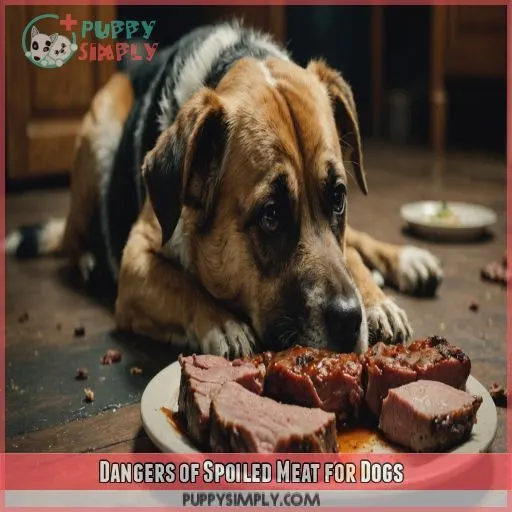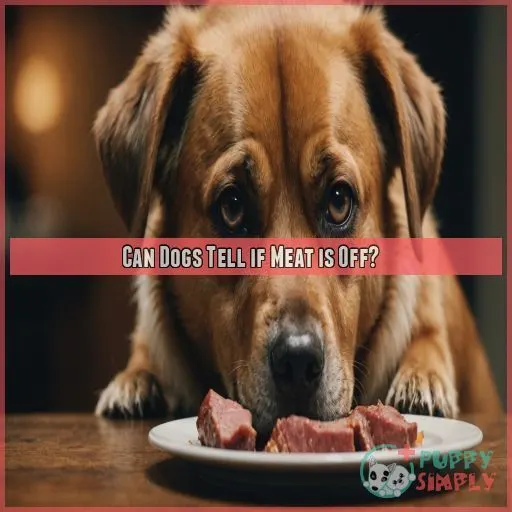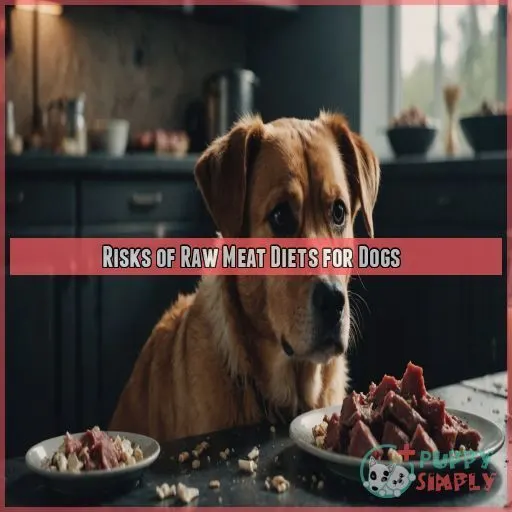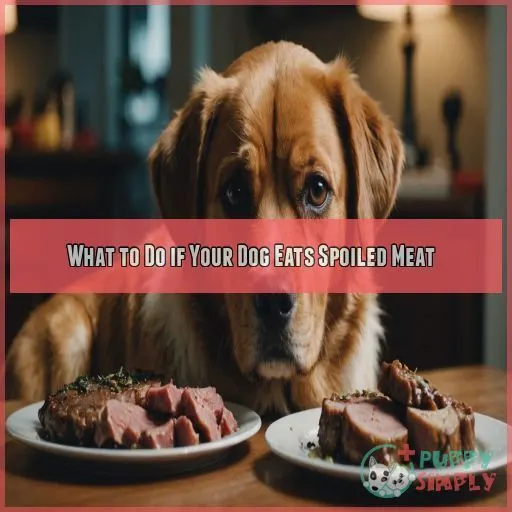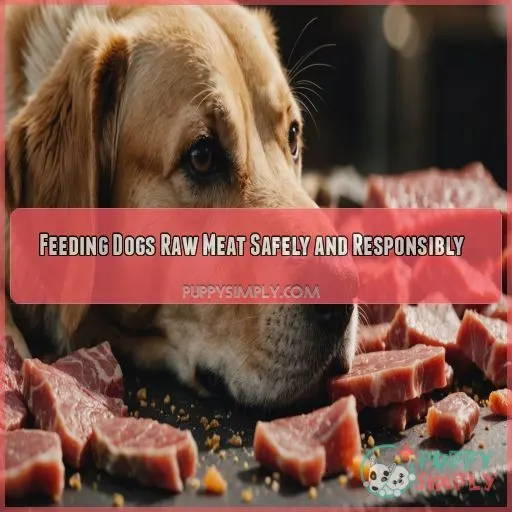This site is supported by our readers. We may earn a commission, at no cost to you, if you purchase through links.
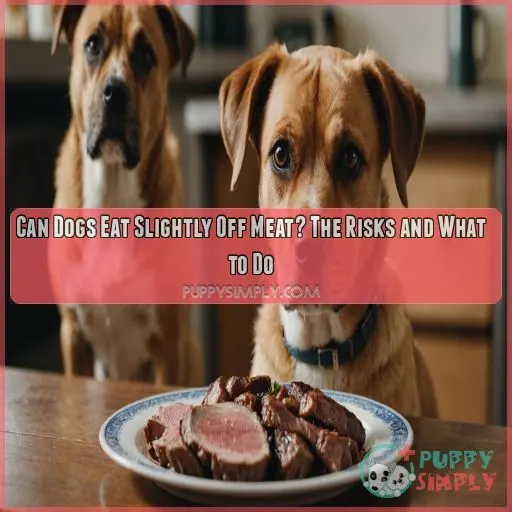
That funky-smelling stuff in the back of the fridge is a breeding ground for nasty bacteria like E. coli that can really mess up your dog’s tummy.
Even if Fido gobbles it down without a second thought, consuming spoiled meat can lead to vomiting, diarrhea, and even long-term health issues.
It’s just not worth the risk.
Your best bet is to stick to fresh, high-quality dog food and treats.
Your furry friend will thank you – and so will your carpet!
Now, let’s get into some more tips to keep your canine companion happy and healthy.
Table Of Contents
- Key Takeaways
- Can Dogs Eat Slightly Off Meat?
- Dangers of Spoiled Meat for Dogs
- Can Dogs Tell if Meat is Off?
- Risks of Raw Meat Diets for Dogs
- What to Do if Your Dog Eats Spoiled Meat
- Feeding Dogs Raw Meat Safely and Responsibly
- Frequently Asked Questions (FAQs)
- Can dogs eat slightly out of date meat?
- What happens if a dog eats spoiled meat?
- Can dogs tell if meat is off?
- Can dogs eat slightly raw meat?
- Can dogs eat cooked meat past its expiration date?
- How to prevent dogs from finding trash?
- What are dog-safe protein alternatives to meat?
- How to identify meat quality before feeding dogs?
- Why do dogs like the taste of spoiled meat?
- Conclusion
Key Takeaways
- Spoiled meat is a breeding ground for nasty bacteria like E. coli that can really mess up your dog’s tummy, leading to vomiting, diarrhea, and even long-term health issues. It’s just not worth the risk, so stick to fresh, high-quality dog food and treats.
- Your dog’s keen sense of smell may warn them about spoiled meat, but their curious nature and scavenging instincts can still tempt them to take a bite. Don’t rely on their nose – keep that funky-smelling stuff far away from your furry friend.
- While raw meat diets may seem natural for dogs, they come with serious risks like bacterial contamination and nutritional imbalances. Chat with your vet to ensure your pup’s raw diet is balanced and safe before making any changes.
- If your dog has eaten spoiled meat, act fast. Contact your veterinarian immediately, as prompt medical attention is vital to prevent serious health consequences. Induce vomiting with hydrogen peroxide, but be sure to follow your vet’s advice closely.
Can Dogs Eat Slightly Off Meat?
You might think your dog can handle a little spoiled meat, but it’s riskier than you might realize. Bad meat can be teeming with harmful bacteria, so even a tiny bite may lead to a big trip to the vet.
Risks of Consuming Spoiled Meat
Spoiled meat is a recipe for disaster! It’s like playing Russian roulette with your dog’s tummy. Here’s the scoop:
- Bacterial Growth: E. coli and other baddies thrive in off meat.
- Human vs. Dog Digestion: Dogs aren’t immune superheroes.
- Food Poisoning Risks: Vomiting, diarrhea—oh my!
- Long-Term Health Risks: Repeated indulgences may risk their longevity.
Can you afford the risk?
How to Identify Spoiled Meat
When’s the last time you sniffed a carton of milk, contorting your nose like a detective? Identifying spoiled meat involves similar detective skills. Smell it—off odors are a dead giveaway. Inspect the texture; sliminess is a red flag. Check the color; any funky tints or mold? Time to toss it! Prioritize dog food safety over risks.
Safe Handling and Storage of Meat
Let’s talk about meat storage temperatures and avoiding cross-contamination risks, shall we?
Proper handling and storage of meat is essential for your pup’s health.
Keep raw dog food in your freezer for safety.
When thawing meat, use safe methods: refrigeration or cold water baths.
Ignoring food safety regulations is like playing with fire.
Keep those canine digestion troubles at bay!
Dangers of Spoiled Meat for Dogs
Consuming spoiled meat can pose serious health risks for your canine companion. From bacterial contamination to life-threatening conditions like botulism, it’s important to keep your dog far away from any meat that’s past its prime.
Bacterial Contamination and Food Poisoning
Dogs love sniffing around, and sometimes they grab slightly off meat thinking they’ve hit the jackpot.
But remember, bacterial contamination in spoiled meat can lead to food poisoning.
Pathogens like Salmonella and E. coli aren’t picky; they attack canine tummies just like ours.
Stick to fresh, safe options!
Trust your nose—bad smell, bad idea.
Prioritize your dog’s health with smart choices.
Symptoms of Food Poisoning in Dogs
If Fido’s suddenly thrown up, got the runs, or taken an extended nap, he might be battling food poisoning. Look out for symptoms like vomiting, diarrhea, lethargy, fever, and abdominal pain. It’s like a bad belly party no one wants to attend. Keep an eagle eye on your furry friend and consult a vet for dog care advice.
Long-term Health Risks of Consuming Spoiled Meat
How might slightly off meat harm your dog in the long run? It’s not just a tummy ache; serious risks loom:
- Liver damage: Affects metabolism; risky business.
- Kidney failure: Impacts waste removal, like a clogged filter.
- Immune suppression: Like a poorly trained guard dog.
- Chronic illness: Alters their eating habits.
Guard your pet’s health like they guard your heart!
Can Dogs Tell if Meat is Off?
While dogs have a keen sense of smell and taste, they don’t always avoid spoiled meat. In fact, a dog’s natural scavenging instincts may lead them to consume spoiled food, despite the potential health risks. (Source)
Dogs’ Sense of Smell and Taste
Dogs have a knack for sniffing out trouble, and their sense of smell is no exception. With scent detection far superior to ours, they usually know when something’s off. However, their taste buds don’t always stop them. So, even if their nose says "stay away," their canine instincts might ignore the warning. Pet insurance can’t cover poor eating choices!
Canine Instincts and Food Selection
Every pet parent knows dogs’ hunting instincts can lead to odd dog food preferences, yet humans can be picky eaters too! Dogs rely heavily on smell and taste, often detecting differences in pet food that escape us. Still, these instincts mightn’t always trigger food aversions. Trust canned food or pet food finders for reliable dog food recommendations.
Why Dogs May Still Eat Spoiled Meat
Dogs might eat spoiled meat because of their survival instincts, curiosity, or limited choices. Just like us when we can’t resist those leftovers, they may not be aware it’s off. Remember:
- Scent Masking: Spoiled meat might hide its true smell.
- Instincts: Dogs think, "Waste not, want not."
- Curiosity: Like puppies, they’re adventurous eaters!
Risks of Raw Meat Diets for Dogs
While raw meat diets may seem natural for dogs, they come with serious risks. Bacterial contamination and nutritional imbalances can lead to health complications that are best avoided.
Raw Dog Food and Bacterial Contamination
There’s a twist in raw diets—bacterial contamination lurks around the corner! Foods like raw meat require handling with kid gloves to prevent bacterial villains such as Salmonella and E. coli.
| Bacteria Types | Storage Tips |
|---|---|
| Salmonella | Keep it chilled |
E. coli
Ensure proper storage to dodge food poisoning. Keep Fido safe and sound!
Nutritional Balance and Deficiencies in Raw Diets
A raw diet can be a nutritional minefield for your dog. Think of it as a tricky jigsaw puzzle: missing pieces like calcium or taurine can spell trouble. Without the right balance, raw diet risks surface, demanding raw diet supplements. No one’s saying skip broccoli, but do chat with your vet to dodge nutritional pitfalls.
Increased Risk of Health Complications in Raw Meat Diets
After tackling nutritional concerns, let’s chew on the increased health risks with raw meat diets. Think of it as playing with fire blindfolded, where you might encounter:
- Parasite risks: Unwanted stowaways.
- Bacterial imbalances: Gut chaos!
- Nutritional deficiencies: A mystery diet gamble.
- Bone splinters: Ouch, sharp surprises!
Choose wisely to dodge these troubles.
What to Do if Your Dog Eats Spoiled Meat
If your dog has recently eaten spoiled meat, act quickly. Contact your veterinarian immediately, as prompt medical attention is vital to prevent serious health consequences.
Immediate Action and Veterinary Care
When your dog eats spoiled meat, it’s time to hit the panic button, or at least call your vet ASAP check for symptoms of food poisoning!
Emergency vet visits can be lifesavers in the face of dog food poisoning.
An ounce of prevention beats a pound of cure, so follow vet advice closely.
Keep an eye out, like a hawk, by monitoring symptoms in your furry friend.
Inducing Vomiting and Settling the Stomach
If Spot gobbles rotten meat, act fast! First, induce vomiting with hydrogen peroxide safety in mind:
- Administer 3 tablespoons of 3% hydrogen peroxide.
- Wait 10 minutes—if Spot’s still not upchucking, repeat once.
- Try stomach settling foods like boiled chicken and rice.
- If vomit’s a no-show, it’s vet time! Home remedies vs. vet care—it’s better to be safe.
Monitoring for Signs of Food Poisoning
Once your dog has vomited, keep your eyes peeled for signs of food poisoning like lethargy or diarrhea. A wagging dog can mask discomfort, so be alert! If Fido seems feverish or in abdominal pain, it’s time to call the vet. Remember, catching these symptoms early is like nipping trouble in the bud. Stay vigilant!
Feeding Dogs Raw Meat Safely and Responsibly
Feeding your dog a raw meat diet requires careful planning and oversight. Talk to your veterinarian to make sure your pup’s raw diet is balanced and safe, and keep a close eye on their health throughout.
Consulting With a Veterinarian on Raw Diets
After dealing with spoiled meat, you might wonder about feeding your dog a raw diet. Before diving in, chat with your vet. They’ll help you navigate:
- Raw diet safety
- Vet approval
- Nutritional needs
- Allergies and parasite risk
Ensuring Balanced Nutrition and Safe Handling Practices
When considering raw diets, your canine companion’s nutritional needs are like a puzzle. Avoid going for random dog food brands that might be missing key pieces. Stick to safe meat handling and food storage tips, minimizing raw diet risks. Remember, your dog’s mealtime shouldn’t be a "meat and greet" with bacteria! Keep their food fresh and balanced for health.
Ongoing Monitoring of Your Dog’s Health
Keeping an eye on your dog’s health is like having a weather-forecasting superpower. Regular vet checkups, noting diet changes, and behavior shifts can catch issues early. Don’t forget to glance at their stool—they tell tales! Staying updated with dog health trends helps you be in the driver’s seat, steering your furry friend’s health journey with confidence and care.
Frequently Asked Questions (FAQs)
Can dogs eat slightly out of date meat?
Feeding your dog slightly out-of-date meat is like playing Russian roulette with their health. Harmful bacteria could lurk in expired meat, posing serious risks. Stick to fresh food—it’s safer and keeps tails wagging happily (Source).
What happens if a dog eats spoiled meat?
If your dog gobbles up spoiled meat, you might notice vomiting, diarrhea, or lethargy. Think of it as a stomach rollercoaster. Contact your vet pronto to keep your furry friend safe and sound. Better safe than sorry!
Can dogs tell if meat is off?
Dogs can detect spoiled meat through their keen sense of smell, but they may still eat it despite the risks. If your dog has eaten spoiled meat, contact your vet immediately, as it can cause serious illness. (Source)
Can dogs eat slightly raw meat?
Dogs can eat raw meat, but aim for fresher cuts. Slightly off meat is risky, like that "last donut" nobody should eat. Better stick to high-quality raw options and consult your vet for safe meals.
Can dogs eat cooked meat past its expiration date?
Tread carefully when serving cooked meat past its prime to your furry friend. If it smells funky or looks iffy, it’s a no-go. Dogs may eat odd things but keep spoilage off their menu. Consult your vet.
How to prevent dogs from finding trash?
Keep trash cans dog-proof by using bins with tight-fitting lids or placing them in secure locations. You could even say "out of sight, out of mind!" Training commands like "leave it" adds another layer of safety and control.
What are dog-safe protein alternatives to meat?
For a pup-approved protein boost, try lean turkey, chicken, eggs, or even plant-based options like beans, lentils, and tofu. These dog-safe choices can satisfy their cravings without the risks of questionable meat. Your furry friend’s health is worth the extra care!
How to identify meat quality before feeding dogs?
Check meat for an off smell, discoloration, or slimy texture before feeding it to your dog. If something seems fishy, toss it! Better safe than sorry—our furry friends deserve only the freshest fare.
Why do dogs like the taste of spoiled meat?
Ever noticed your dog’s nose leads them to what we’d avoid? It’s their primal instincts! They might find the smell appealing, yet it’s a riddle wrapped in danger. Spoiled meat can be a ticking time bomb for them.
Conclusion
Did you know nearly 10% of pet owners admit to feeding their dogs slightly off meat?
While it might seem harmless, you should remember the risks.
Dogs can’t always detect spoiled meat, and eating it can lead to immediate and long-term health issues.
So, stick with fresh, high-quality options to keep those tails wagging and avoid any carpet mishaps.
Your attention to their health will make both you and your canine companion thankful!

